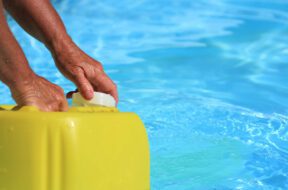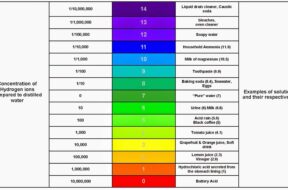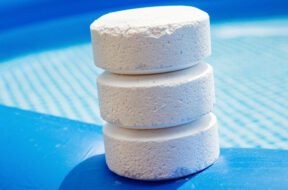
Want to learn more about algaecide? Read on to find out when to add algaecide to your pool maintenance routine and other helpful tips.
When the heat eventually leaves and the cold replaces it, swimming pool covers can help preserve the heat in your pool. These pool covers come in multiple styles and designs, and it’s important you buy the best one for your situation. On Pool Calculator we are going to be running through these different designs. Here we will touch on the pros and cons of each cover and provide insight on which cover fits your current situation.
See article on “How Much Does Pool Maintenance Cost?”
Standard winter covers are simple thin tarps that cover your pool. This shields the pool from sunlight and small debris that could make its way into your pool while it is closed. Because the price point is so low, however, there are tradeoffs in terms of overall quality. The cover does its job to make sure your pool stays clean, but does not offer much beyond the bare minimum for you. This means that you get what you pay for, but some regions do not require much in terms of protection.
A step up from the traditional and simple tarp cover, these covers are a popular and useful item. Security covers act like a trampoline, with spring straps anchoring it to the pool. This system keeps the cover in place and working hard to protect your pool. This is clearly a step up from tarp covers, and has actual lockdown that provides more than baseline coverage. These security covers come in two variants; mesh and vinyl.
Mesh covers
Vinyl covers
Mesh covers
Vinyl covers
Automatic covers are the cream of the crop in the broad category of pool covers. These covers are the most expensive, however, and have a wide ranging set of different price points. Expensive but effective, automatic covers offer the most heavy duty protection for the consumer. This protection is paired with an automatic deploy that is convenient and simple to use. These covers offer plenty of unique benefits that are useful to the consumer and justify the heftier price point.
Which cover you need relies heavily on your budget and location. Automatic covers are clearly the best option in terms of quality with the most benefits, but the largest cost. Security covers offer a medium cost/medium efficiency rating. Lastly, winter tarp covers are the budget option but do a good job for a low price point.
One of the main concerns when deciding on a pool cover for you is your location. If you are located in a sunny area, like California or Florida, you could opt for a cheaper option. This is because these areas have an almost nonexistent winter season. Snow, harsh rain, and other damage can not affect you in these situations, so a simple tarp will likely do the job. However, if you’re in an area like Colorado with nasty winters you will likely need a heavy-duty option. This is a situation where the security or automatic cover could be useful for you.
At the end of the day, the choice of pool cover is ultimately yours. There are plenty of positive and negative characteristics for each cover. Depending on your budget, your location, and your level of commitment, the best option is not clear for each consumer. That is why we at Pool Calculator will simply lay the information out, but leave the final say to you.
Try out our Pool Calculator as you clean and maintain your pool! For more information on how to care for your swimming pool, see our blogs on Pool Maintenance

Want to learn more about algaecide? Read on to find out when to add algaecide to your pool maintenance routine and other helpful tips.

In this quick guide, we’ll answer the question “can you over shock a pool” and unveil the factors to consider when shocking a pool.

Maintaining both pH and total alkalinity in your swimming pool is important for keeping your pool properly sanitized and non-corrosive. Total alkalinity is to pH what cyanuric acid is to free chlorine. Total alkalinity stabilizes pH levels. The ideal pool pH level is 7.4 to 7.6. The ideal total alkalinity level is 80 to 120 ppm.

The Association of Pool and Spa Professionals recommends free chlorine levels for both swimming pools and hot tubs be kept between 2.0 and 4.0 ppm. However, the Center for Disease Control recommends free chlorine stay above 1 ppm in pools and 3 ppm in hot tubs.